
NORTHWEST SCIENCE
Scope & Guideline
Bridging regional insights with global implications.
Introduction
Aims and Scopes
- Ecological Research and Biodiversity:
The journal focuses on studies that assess and document biodiversity, including species distribution, habitat preferences, and ecological interactions within the Pacific Northwest. This includes both flora and fauna, with an emphasis on threatened and endemic species. - Environmental Impact Studies:
Research published in NORTHWEST SCIENCE often evaluates the effects of human activities, such as dam removal, urbanization, and agricultural practices, on local ecosystems. This includes studies on habitat restoration, species recovery, and the resilience of ecosystems to anthropogenic changes. - Climate Change and Ecological Responses:
The journal explores how climate change impacts ecological dynamics, including species migration, phenology, and habitat alteration. Studies may include long-term monitoring and modeling of ecological responses to changing climatic conditions. - Cultural and Historical Ecology:
NORTHWEST SCIENCE recognizes the importance of cultural perspectives in ecological research, often publishing papers that explore the intersection of ecological science with indigenous knowledge and historical land use practices. - Conservation Strategies and Management Policies:
The journal addresses conservation efforts and policy implications by publishing research that informs sustainable management practices and policy decisions for natural resources in the Pacific Northwest.
Trending and Emerging
- Ecological Restoration and Management:
There is a growing emphasis on research that addresses ecological restoration techniques and their effectiveness. This includes studies on habitat restoration following disturbances, such as dam removals and wildfire recovery, reflecting an urgent need for actionable conservation strategies. - Impact of Climate Change on Ecosystems:
Research exploring the impacts of climate change on species distributions, ecological interactions, and habitat changes is increasingly prominent. This includes studies on phenological shifts and adaptive management practices to mitigate climate-related challenges. - Urban Ecology and Human-Wildlife Interactions:
With urbanization on the rise, studies examining the dynamics of urban ecosystems and the interactions between wildlife and humans are gaining traction. This includes assessments of biodiversity in urban settings and the effects of urban development on local species. - Aquatic Ecosystems and Freshwater Biodiversity:
There is a notable increase in research focusing on freshwater ecosystems, particularly concerning fish communities, aquatic plants, and the impacts of hydrological changes. This trend highlights the importance of freshwater biodiversity in the Pacific Northwest. - Integrative Approaches to Conservation:
Research that integrates ecological, social, and economic perspectives in conservation planning is becoming more common. This reflects a holistic understanding of the complexities involved in managing natural resources and fostering sustainable practices.
Declining or Waning
- Traditional Taxonomy Studies:
Research focused solely on traditional taxonomic classifications has decreased. While taxonomy remains important, there is a growing trend towards integrative approaches that combine genetic, ecological, and behavioral studies, leading to less emphasis on classic taxonomic descriptions. - Historical Ecology Without Modern Context:
Papers that solely focus on historical ecological conditions without integrating contemporary ecological challenges or management implications are less frequent. There is a shift towards research that links historical data with current environmental issues and conservation strategies. - Generalist Studies of Common Species:
Research on common or widely distributed species has declined, as there is a stronger focus on conservation concerns for threatened and unique species that require immediate attention and resources. - Purely Descriptive Studies:
There is a noticeable reduction in purely descriptive ecological studies that do not offer insights into management or conservation actions. The journal is increasingly prioritizing research that provides actionable recommendations based on ecological findings.
Similar Journals
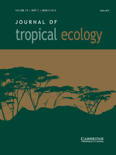
JOURNAL OF TROPICAL ECOLOGY
Exploring the Rich Tapestry of Tropical EcosystemsThe JOURNAL OF TROPICAL ECOLOGY, published by Cambridge University Press, serves as a pivotal platform for advancing knowledge in the field of ecology, particularly within tropical environments. With an ISSN of 0266-4674 and an E-ISSN of 1469-7831, this esteemed journal has been a key resource since its inception in 1985, maintaining a focus on empirical research that addresses the complexities of tropical ecosystems. It holds a respectable Q3 ranking in the Ecology, Evolution, Behavior and Systematics category as of 2023, indicating its significant contribution to the field, although it remains within the competitive mid-range. The journal publishes original research, reviews, and methodological articles that illuminate the rich biodiversity and unique ecological processes of tropical regions, fostering a deeper understanding of conservation challenges. Accessible from the United Kingdom, this publication appeals to a diverse audience of researchers, professionals, and students keen on exploring ecological dynamics in tropical settings, and plays a crucial role in promoting scientific discourse and collaborative efforts aimed at preserving our planet's vital ecosystems.

REVISTA CHILENA DE HISTORIA NATURAL
Fostering Innovation in Agricultural and Biological SciencesREVISTA CHILENA DE HISTORIA NATURAL, published by the SOCIETAD BIOLOGIA CHILE, is an esteemed open-access journal dedicated to the fields of Agricultural and Biological Sciences as well as Environmental Science. With an ISSN of 0716-078X and an E-ISSN of 0717-6317, the journal has maintained an impactful presence since its inception in 2000, offering unrestricted access to vital research that influences the biodiversity and ecological initiatives in the region and beyond. Positioned in the Q2 quartile for Agricultural and Biological Sciences and Q3 for Environmental Science as of 2023, REVISTA CHILENA DE HISTORIA NATURAL exemplifies its commitment to high-quality and influential research, evidenced by its respectable ranking in Scopus—89th percentile for Agricultural and Biological Sciences and 131st in Environmental Science. Operated out of Santiago, Chile, and covering a wide range of topics with a converging publication timeline from 2002 to 2024, this journal serves as a crucial resource for researchers, professionals, and students looking to deepen their understanding of natural history and its implications for future ecological preservation.

Journal of Fish and Wildlife Management
Exploring the intersection of ecology and wildlife management.The Journal of Fish and Wildlife Management, published by the U.S. Fish & Wildlife Service, serves as a vital resource for scholars, researchers, and professionals in the fields of Animal Science, Ecology, and Conservation Biology. With its ISSN 1944-687X, this esteemed journal has been disseminating critical research findings since 2010, contributing significantly to the understanding of fish and wildlife conservation practices and their ecological impacts. Despite its Q3 category rankings in various disciplines as of 2023, it provides a platform for innovative research that influences policy and management strategies for biodiversity conservation. The journal, although not open access, remains committed to advancing the scientific discourse surrounding wildlife management with articles that emphasize practical conservation efforts and ecological sustainability. Readers can expect a diverse range of articles that promote best practices in the management and conservation of fish and wildlife resources, furthering our collective mission of preserving ecological health and biodiversity for future generations.
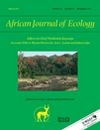
AFRICAN JOURNAL OF ECOLOGY
Exploring Africa's Ecological RichnessThe African Journal of Ecology, published by Wiley, is a leading academic journal in the field of Ecology, Evolution, Behavior, and Systematics. Established in 1963 and continuing its vital contributions to the field until 2024, this journal serves as a premier platform for researchers and scholars to share groundbreaking studies that explore the intricate relationships within ecosystems, particularly in the African context. With an impressive Scopus Rank of #423 out of 721 and a Q3 Quartile ranking, it stands as a credible source of scholarly information, gaining recognition among peers for its rigorous peer-review process and impactful publications. While the journal is not open access, it remains influential in driving advancements in ecological research and providing insights vital for conservation efforts and biodiversity studies. Authors and readers alike will find that the African Journal of Ecology not only promotes scientific inquiry but also fosters a deeper understanding of ecological dynamics that affect our world.
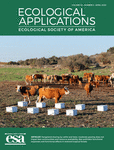
ECOLOGICAL APPLICATIONS
Transforming ecological theory into practice.ECOLOGICAL APPLICATIONS, published by WILEY, is a leading journal in the field of ecology, providing a platform for innovative research that addresses the understanding and management of ecological systems. With an ISSN of 1051-0761 and E-ISSN of 1939-5582, it has established itself as a vital resource for ecologists and environmental scientists since its inception in 1991. Ranked in the top quartile (Q1) for Ecology in 2023 and with a Scopus ranking of 40 out of 461 in Environmental Science, ECOLOGICAL APPLICATIONS boasts an impressive impact factor, attesting to its significance and influence in the field. The journal's mission is to publish peer-reviewed articles that contribute to ecological theory and its applications in conservation and environmental management. Researchers, professionals, and students alike will find invaluable insights and the latest developments in ecological research through its comprehensive scope and rigorous scholarship, ensuring a crucial role in shaping future ecological practices and policies.
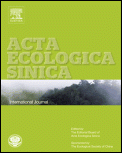
Acta Ecologica Sinica
Pioneering research at the intersection of ecology and sustainability.Acta Ecologica Sinica, published by Elsevier, is a prominent journal in the field of ecology, with a strong focus on fostering understanding in ecological principles and their applications. Established in China, this journal holds an impressive Q2 categorization in both Ecology and Ecology, Evolution, Behavior and Systematics as of 2023, positioning it within the top tier of ecological research. With its Scopus rankings placing it in the 81st and 78th percentiles in relevant ecological domains, it serves as a vital platform for researchers and practitioners to disseminate findings that promote ecological sustainability. Although it operates under a traditional access model, its significant impact is underscored by its systematic convergence of key ecological inquiries across multiple years (2006-2008, 2014, 2017-2023). By engaging with the latest empirical studies, theoretical advancements, and methodological innovations, Acta Ecologica Sinica is indispensable for scholars dedicated to advancing ecological knowledge and addressing environmental challenges.

Neotropical Biology and Conservation
Innovating Conservation Strategies for Future GenerationsNeotropical Biology and Conservation, published by Pensoft Publishers, serves as a pivotal platform for researchers and professionals dedicated to the understanding and preservation of biodiversity in the Neotropical region. This Open Access journal, operational since 2006 and based in Brazil, invites contributions that delve into the complexities of ecology, evolution, and conservation strategies pertinent to the diverse ecosystems of South and Central America. With a commendable 2023 impact factor reflected in its Q3 rankings across multiple categories including Animal Science, Ecology, and Plant Science, it stands as a valuable resource for academics seeking to publish innovative findings and foster dialogue in these critical areas of study. The journal's commitment to open access ensures that knowledge is readily available to anyone interested in advancing the field of neotropical biology and conservation. Join the global conversation and contribute to the vital work of preserving our planet’s rich biological heritage through rigorous research published in this esteemed journal.

WETLANDS ECOLOGY AND MANAGEMENT
Elevating the discourse on ecological management and preservation.Wetlands Ecology and Management, published by Springer, is an esteemed journal that has been advancing the field of wetland studies since its inception in 1982. Operating under the ISSN 0923-4861 and E-ISSN 1572-9834, this journal is headquartered in the Netherlands and serves as a critical resource for researchers, professionals, and students alike. It fosters interdisciplinary dialogue among aquatic science, ecology, and resource management disciplines, ranking in the Q2 category for Aquatic Science and Ecology, Evolution, Behavior and Systematics as of 2023. With a notable Scopus ranking, it is positioned favorably within the 65th percentile in Ecology and a commendable 58th percentile in Aquatic Sciences. The journal emphasizes the importance of effective management strategies and policies in the conservation of wetlands, making it indispensable for those aiming to drive impactful research. Although it is not an open-access journal, its high-quality publications remain accessible through library consortia and institutional subscriptions, ensuring that pertinent insights into the ecological dynamics and sustainable management practices are available to the global research community.

AMPHIBIAN & REPTILE CONSERVATION
Advancing Conservation Through Cutting-Edge ResearchAMPHIBIAN & REPTILE CONSERVATION, published by the Amphibian Conservation Research Center & Lab, is a leading journal dedicated to the field of herpetology and environmental conservation. With an ISSN of 1083-446X and an E-ISSN of 1525-9153, this journal serves as a vital resource for researchers, conservationists, and students interested in the preservation of amphibian and reptile species. The journal has achieved remarkable rankings, categorized in the Q2 quartile for Animal Science and Zoology, Ecology, and Nature and Landscape Conservation as of 2023, reflecting its significant contribution to the scientific community. Over the converged years from 2016 to 2024, the journal has established itself as an integral platform for disseminating research findings, fostering collaboration, and enhancing the understanding of biodiversity and ecosystem dynamics. By embracing an open-access approach, AMPHIBIAN & REPTILE CONSERVATION ensures that critical research is readily available to a global audience, promoting informed conservation efforts and policy advocacy to safeguard these vital species amidst their declining populations.
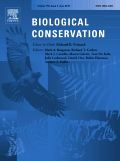
BIOLOGICAL CONSERVATION
Elevating Conservation Efforts with High-Impact Findings.BIOLOGICAL CONSERVATION, published by Elsevier Science Ltd, is a leading international journal dedicated to advancing the science and practice of biological conservation. Since its inception in 1968, the journal has provided a critical platform for researchers, professionals, and students in the fields of Ecology, Evolution, Behavior, and Systematics as well as Nature and Landscape Conservation. With an impressive impact factor, and ranked in the Q1 category within both ecological and conservation domains in 2023, it emphasizes high-quality empirical and theoretical research essential for understanding and addressing pressing environmental challenges. Although it follows a subscription model, the journal is known for its rigorous peer-reviewed articles that contribute significantly to the field, ensuring that the latest findings and methodologies are readily accessible to practitioners. As a vital resource for those engaged in conservation efforts globally, BIOLOGICAL CONSERVATION stands out for its commitment to enhancing knowledge and informing strategies that safeguard biodiversity across ecosystems.